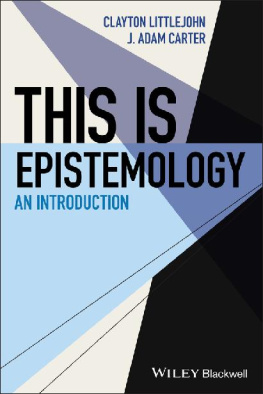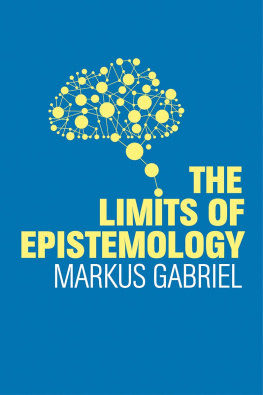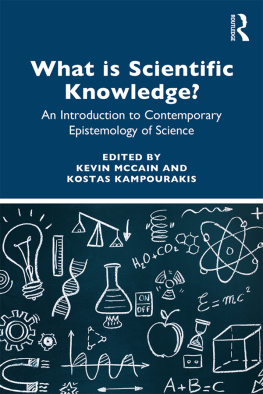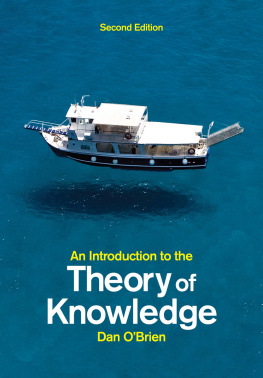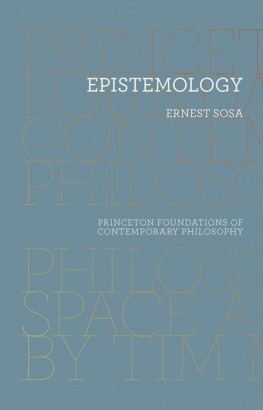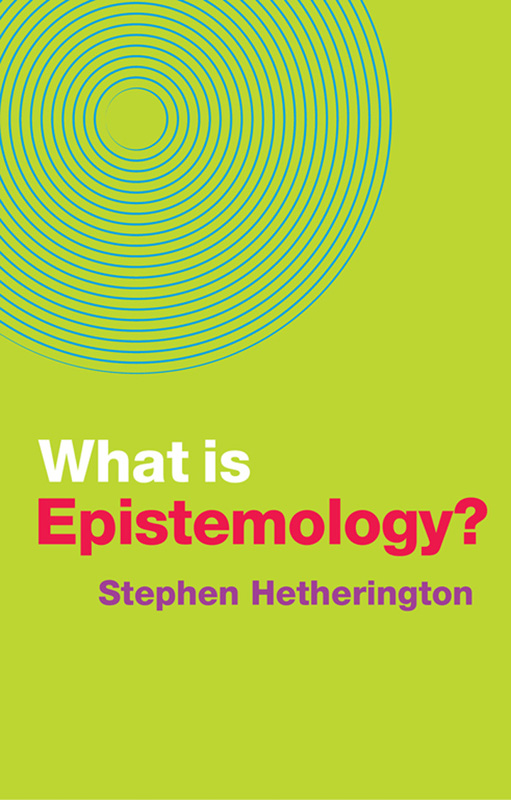Table of Contents
Guide
Pages
Polity's What is Philosophy? series
Sparkling introductions to the key topics in philosophy, written with zero jargon by leading philosophers.
Stephen Hetherington, What is Epistemology?
Charles Taliaferro, What is Philosophy of Religion?
What is Epistemology?
Stephen Hetherington
polity
Copyright Stephen Hetherington 2019
The right of Stephen Hetherington to be identified as Author of this Work has been asserted in accordance with the UK Copyright, Designs and Patents Act 1988.
First published in 2019 by Polity Press
Polity Press
65 Bridge Street
Cambridge CB2 1UR, UK
Polity Press
101 Station Landing
Suite 300
Medford, MA 02155, USA
All rights reserved. Except for the quotation of short passages for the purpose of criticism and review, no part of this publication may be reproduced, stored in a retrieval system or transmitted, in any form or by any means, electronic, mechanical, photocopying, recording or otherwise, without the prior permission of the publisher.
ISBN-13: 978-1-5095-2950-6
ISBN-13: 978-1-5095-2951-3(pb)
A catalogue record for this book is available from the British Library.
Library of Congress Cataloging-in-Publication Data
Names: Hetherington, Stephen Cade, author.
Title: What is epistemology? / Stephen Hetherington.
Description: Medford, MA : Polity, 2019. | Series: What is philosophy? | Includes bibliographical references and index.
Identifiers: LCCN 2018043384 (print) | LCCN 2018047897 (ebook) | ISBN 9781509529537 (Epub) | ISBN 9781509529506 (hardback) | ISBN 9781509529513 (pbk.)
Subjects: LCSH: Knowledge, Theory of.
Classification: LCC BD161 (ebook) | LCC BD161 .H46 2019 (print) | DDC 121dc23
LC record available at https://lccn.loc.gov/2018043384
Typeset in 11 on 13pt Sabon by Toppan Best-set Premedia Limited
Printed and bound in Great Britain by CPI Group (UK) Ltd, Croydon
The publisher has used its best endeavours to ensure that the URLs for external websites referred to in this book are correct and active at the time of going to press. However, the publisher has no responsibility for the websites and can make no guarantee that a site will remain live or that the content is or will remain appropriate.
Every effort has been made to trace all copyright holders, but if any have been overlooked the publisher will be pleased to include any necessary credits in any subsequent reprint or edition.
For further information on Polity, visit our website: politybooks.com
Preface and Acknowledgements
There is philosophy within each of us.
No, that's not me at all. I'm not philosophical.
Actually, I'll bet that you are more philosophical than you realize. Do you think of yourself as lacking time or aptitude for philosophy? Have you ever really tried it? Have you ever taken it seriously?
No, I've always had so much else to do. And no one encouraged me to think about philosophy.
Well, I'm encouraging you, right now.
Thanks. Okay, you say that I already have some philosophy within me. Why wouldn't I have noticed it? Surely it's impossible to have it without noticing it.
No, it is possible. Even if you aren't conscious of an inner philosophy, it could be there, a part of you. Maybe others notice it, when watching how you behave: you might unwittingly be enacting a philosophy, displaying it in how you act, in how you carry yourself. Words are not always needed for this; you could be wordlessly living a philosophy. For example, perhaps you react sympathetically, respectfully, and generously to everyone, including people with a lower socioeconomic standing than your own. You might never notice this about yourself; you do it automatically. Even so, you would be living an acceptance of a form of egalitarianism a thesis often discussed within political or social philosophy.
Of course, it is one thing to have a philosophy. It is another thing to have or live a good philosophy one of which to be proud, with which you are content to be identified publicly. Is your philosophy already as good as it could be? As it should be? Those questions arise equally about a lived philosophy: what if you are only egalitarian in your actions within your own country, not when visiting elsewhere? Those are blunt questions, but we may react optimistically, seeing within them the invigorating idea of finding and thenimproving your philosophy. Nor does the optimism stop there: to improve your philosophy is to improve your self, particularly if your philosophy is located so deeply within you as to be animating and guiding your actions.
This book embraces that general theme, with a specific focus. We will be doing epistemology, a pivotal part of philosophy. Epistemology asks about the nature and value of knowledge your knowledge, anyone's knowledge. And yes, you already have some epistemology within you. Believe me, you do. (Even being able and willing to think about this idea could mark you as somewhat epistemological.) Maybe yours is still a fledgling epistemology fragmentary, incomplete, underdeveloped. It probably needs further work before it is polished, purposeful, powerful. How should you begin that work? How should you pursue it?
Here is how you can start: read this book, critically and questioningly. You will be reflecting deliberately and overtly upon philosophical ideas about knowledge. This will give you a better sense of what to look for in an epistemology. Otherwise, you might not understand even what thoughts within you, and what actions you perform, amount to an epistemology at all. You could be looking within yourself without adequate guidance. You might flounder. You might waste time and energy. You might lose motivation.
This book can fix all of that. It can help you to appreciate what an epistemology is. Feel encouraged to find your own epistemology. Then challenge yourself to enrich it. In that way, this is a self-help book. After reading the book, you will have more and improved epistemology within you. You will have thought further about what knowledge is and why it matters. You will have reflected upon this vital aspect of yourself.
Here is an analogy. It is likely that everyone has within them some moral philosophy, such as views about what makes an action or a person morally good or bad. But maybe not everyone has an impressive moral philosophy. As social media make abundantly clear, day after day, so many people have much to say about what is moral, and what is not. With unending energy, they express opinions on what is right and what is wrong yet usually without depth and consistency, subtlety or complexity, in their moral stances. This could be improved by those people reflecting more philosophically upon morality consciously noticing, modifying, and extending their own moral ideas, first of all. It is possible to become a better thinker, a more sage adviser, about moral matters.
And what is possible in that way for ideas about morality is also possible for ideas about knowing. This book is here to help you to sharpen and deepen your thinking about knowledge what it is, what is involved in having it. This can be intellectually and personally demanding. Luckily, it is also fun.
Pascal Porcheron at Polity invited me to write this book. I welcomed the chance to do so. I enjoy the challenge of conveying complex philosophical ideas simply. (So I have minimized references, throughout the body of the book, to specific authors. Such details appear in the Further Reading section.) Pascal gave me some very useful editorial advice, as did two anonymous referees. I am also grateful to Parveen Seehra for her helpful questions and comments on a draft of the book, and to Lindsay Yeates for his expertise regarding one of my examples.


